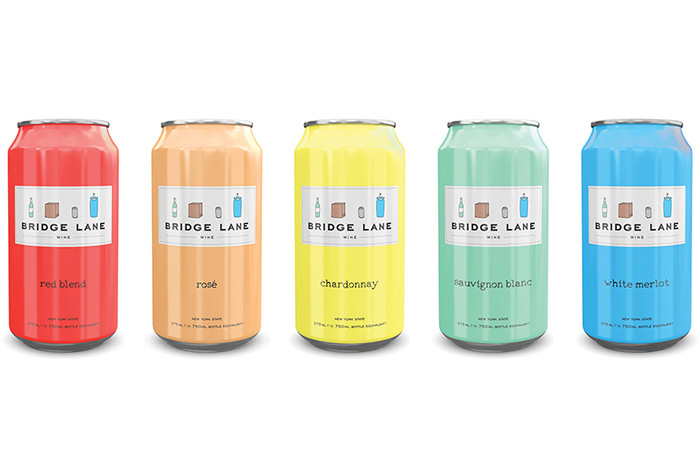Lieb Cellars Releases Canned Wines Under Bridge Lane Label

Cans aren’t just for beer and soup anymore.
Cutchogue winery Lieb Cellars on the North Fork recently rolled out a new line of five canned wines under their Bridge Lane label. The winery successfully completed a test batch of their rosé in can last summer and spent the past five months tweaking the packaging, lab testing the cans and developing four new varieties.
The full line consists of a white merlot, unoaked chardonnay, sauvignon blanc, dry rosé and red blend in 375 milliliter cans—about half a bottle, or two glasses worth. But who needs glasses?
Known for breaking tradition and embracing alternative wine packaging—they were the first to launch 3 liter premium box wine and 20 liter disposable keg wine locally in 2014—putting wine in can is a natural next step in Lieb’s progression.
The move adds Lieb and Bridge Lane to a growing list of vineyards offering wine in forehead-crushable, shotgun-friendly containers—which also happen to be wonderfully portable and excellent for chilling. Canned brands currently making a splash in the industry include Lila Rosé, California’s Porch Pounder Red Wine Shorties and The Drop Rosé, Union Wine Co.’s Underwood line out of Oregon, The Infinite Monkey Theorem from Colorado, and Arizona-based Grand Canyon Wine Co., to name a few.
Like the screw cap before it, canned wine is the focus of scorn from certain stuffy oenophiles, but it, too, doesn’t appear to be going away. And while Lieb Cellars understands why cans seem best relegated to their Bridge Lane offerings, they’re also smart enough to see the genius in serving a different market.
“Our Lieb Cellars reserve line is our anchor and will always be about crafting the best possible, elegant, age-worthy wines from our estate vineyards,” Lieb Cellars’ General Manager, Ami Opissio says. “Our second label, Bridge Lane, is about making fresh, fruit-forward wines and saying, ‘How can we have some fun and offer value?” she continued, adding, “As young, casual consumers ourselves, what and how do we want to drink wine?”

Lieb says their team was “psyched to try out their test batch rosé cans” last year. “We live near the beach and a bunch of us have or know people who have boats. It was awesome to be able to throw our cans in a cooler next to Greenport Harbor Summer Ales and not have to worry about glass bottles or even cups,” Opisso says.
Most Hamptons beaches prohibit wine bottles, for the obvious danger broken glass presents, so Bridge Lane’s cans present a local solution to a very local problem. Beachgoers should never be forced to sip West Coast rosé on South Fork sand.
The 1,100 test batch cans sold out in two weeks over the summer. “There were people waiting at the tasting room the morning they went on sale, and then they kept coming,” Opisso points out. “I had to hide some in my office for fear they’d be gone before I remembered to grab my samples.”
Packaged in recyclable aluminum cans at Mattituck’s Premium Wine Group—a custom production and crush service for producers looking to outsource equipment and facility operations—Bridge Lane’s canned wines are made from sustainably farmed grapes grown at Lieb Cellars estate vineyard and sourced from other excellent local vineyard sites.
Bridge Lane’s first full, 39,000-can run is selling briskly since it hit shelves in January. “The goal is to have them through the summer but it will be tough to keep up with the demand,” Opisso says, noting that they will produce a smaller run in March, and then likely in April or May just ahead of summer.
They’re available now for $9 each or $34 for four-packs at the Bridge Lane Wine Tasting Room (35 Cox Neck Road) in Mattituck, as well as bridgelanewine.com and at select retail stores and casual restaurants in 10 states along the East Coast.
“We’ve been working on these cans for about a year and a half now,” Opisso says. “It’s pretty cool to finally get to share them with everybody.”
Despite past pushback over Bridge Lane’s boxed wine, their cans have garnered little criticism. “Whatever the reason, the reception and demand has been overwhelmingly positive across the board,” Opisso says. “Now we just have to make more!”



